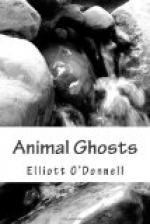Before a death a horse will often neigh repeatedly outside the house of the doomed person, and not infrequently show evidences of terror in passing close to it, from which I deduce the horse can at all events scent the proximity of the phantom of death. Like the dog, however, I think it only possesses this peculiar psychic property in a limited degree. It can, for example, readily detect the whereabouts of phantasms haunting localities, but not so easily those haunting people.
It shows little or no discrimination on sight, between cruel and brutal people and those who are kind, giving the same amount of passing space to the one as it does to the other. Yet, on the other hand, I have watched horses at night, standing in the fields, their heads thrown back, a transfixed, far-off expression in their eyes, sniffing the atmosphere—and snuffling it in a manner that strongly suggested to me they were carrying on, by means of some silent, secret code, a conversation with some superphysical presence, which they either saw or scented, very likely both.
Scent, I am convinced, is the medium of conversation, not only between superphysical animals, but between material animals, and if we ever wish to converse with spirits we must employ cats, dogs, and horses to teach us.
Phantom Coaches
There are few parts of the British Isles—few countries in Europe—which have not their phantom coaches. Perhaps the most famous are those that haunt a road near Newport, South Wales, and an old highway in Devon.
A Spectre Coach and Horses in Pembrokeshire
Miss Mary L. Lewes, in an article called “Some More Welsh Ghosts,” that appeared in the Occult Review for December, 1907, writes thus:—
“In common with several other districts in Great Britain and Ireland, Pembrokeshire possesses a good ‘phantom coach’ legend, localized in the southern part of the county, at a place where four roads meet, called Sampson Cross. In old days the belated farmer driving home in his gig from market was apt to cast a nervous glance over his shoulder as his pony slowly climbed the last pitch leading up to the Cross. For tradition says that every night a certain Lady Z. (who lived in the seventeenth century, and whose monument is in the church close by) drives over from Tenby, ten miles distant, in a coach drawn by headless horses, guided by a headless coachman. She also has no head, and arriving by midnight at Sampson Cross, the whole equipage is said to disappear in a flame of fire, with a loud noise of explosion.”
Miss Mary L. Lewes goes on to add:—
“A clergyman living in the immediate neighbourhood, who told the writer the story, said that some people believed the ghostly traveller had been safely ‘laid’ many years ago in the waters of the lake not far off. He added, however that might be, it was an odd fact that his sedate and elderly cob, when driven home past the Cross after nightfall, would invariably start as if frightened there, a thing which never happened by daylight.”




